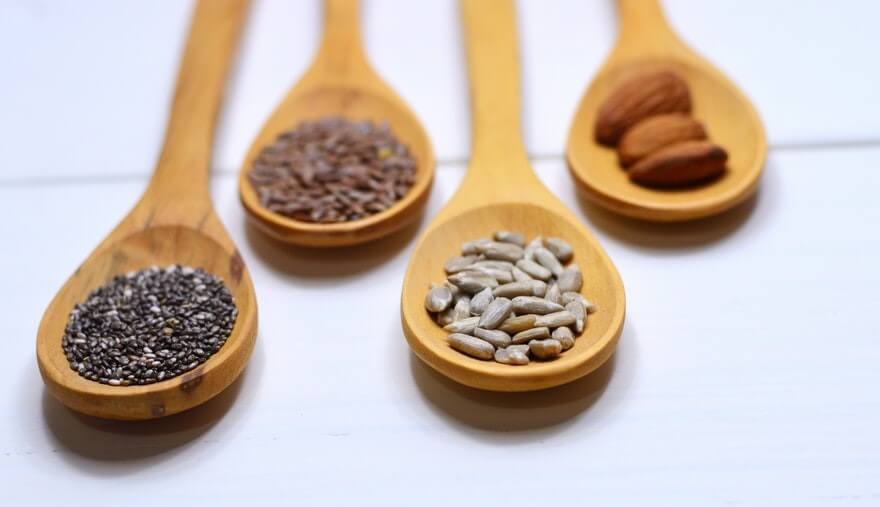Weight loss is all about creating a calorie deficit in your diet.
When it comes to foods like seeds, there are a few things that might affect your caloric intake:
- The calorie density of the seed
- The amount of fiber (which can make it more or less “filling”)
That’s really it.
In order to find the best seeds for weight loss, let’s do a very simple comparison looking at the macro profiles of the most common types of seeds.
Nutrients in Seeds
Let’s start by looking at the macronutrient profiles for the 6 most common seeds. All the data is per 100 grams of each seed and obtained from the USDA’s food database.
*If you’re on a small screen you may need to scroll horizontally to see all the data.
| Chia seeds | Flax seeds | Hemp seeds | Sesame Seeds | Sunflower Seeds | Pumpkin Seeds | |
|---|---|---|---|---|---|---|
| Energy (kcal) | 486.7 | 534.0 | 553 | 573 | 584 | 559 |
| Protein (g) | 16.5 | 18.3 | 31.6 | 17.7 | 20.8 | 30.2 |
| Total Fat (g) | 30.7 | 42.1 | 48.8 | 49.7 | 51.5 | 49 |
| Carbohydrate (g) | 42.1 | 28.9 | 8.67 | 23.4 | 20 | 10.7 |
| Fiber (g) | 34.3 | 27.2 | 4 | 11.8 | 8.6 | 6 |
| Sugars (g) | 0.0 | 1.6 | 1.5 | 0.3 | 2.62 | 1.4 |
There are a few things in particular that are relevant to weight loss:
- Chia seeds are the lowest in calories. Flax seeds are also lower in calories than all the others.
- All seeds are high in fat, but sunflower seeds have the most fat.
- Chia and flax seeds have way more fiber than the other seeds here
One other thing to note is that chia, flax, and hemp seeds all have a lot of omega 3 fats, which are generally healthy. See my page on the omega 3 to 6 ratio of seeds for more detail.
How Protein Affects Weight Loss
I highlighted that hemp and pumpkin seeds are both significantly higher in protein than the other seeds we looked at.
Research suggests that diets higher in protein can aid weight loss, mainly due to the thermogenic effect of protein (source). Up to 20-30% of calories from proteins are consumed while digesting them, which is significantly higher than fats (0-3%) or carbohydrates (5-10%) (source).
Which Seeds Are Most Filling?

How filling a food is typically depends on how much fat and fiber it has.
Unlike carbohydrates, fat typically suppresses appetite for longer, so even though it has more calories upfront, it can lead to better eating habits.
Let’s take a closer look at those 2 things:
| Chia seeds | Flaxseed | Hemp seeds | Sesame Seeds | Sunflower Seeds | Pumpkin Seeds | |
|---|---|---|---|---|---|---|
| Total Fat (g) | 30.7 | 42.1 | 48.8 | 49.7 | 51.5 | 49 |
| Fiber (g) | 34.3 | 27.2 | 4 | 11.8 | 8.6 | 6 |
Since all seeds are high in fat, they will all be pretty filling.
You can argue that sunflower or sesame seeds could be a bit more filling based on the fat content. However, since chia seeds and flax seeds have so much more fiber, they are the more “filling” food overall.
While all nuts are considered highly satiating foods, chia and flax seeds stand out because of their fiber content.
Which Seeds Are Best for Weight Loss?
When we put those 2 pieces together, it’s clear that chia seeds are the best for weight loss, and flax seeds are not far behind.
They have the least calories per serving, while also having the most fiber. In addition, both of these seeds tend to absorb water, which increases how satiating they are.
Other seeds are still okay to eat in moderate amounts and are filling foods, but they have more calories and less fiber, which is likely to result in a lower caloric deficit and less weight loss overall.
Overall, seeds are usually a good food to include on a weight loss diet in moderation, and only one part of successful diet as a whole.
How Many Seeds Should You Eat Per Day?
The Heart Foundation of New Zealand conducted a research review and found that the risk of heart disease decreases when someone eats 3-4 handfuls of nuts or seeds per week (about 15 grams per day).
Most studies use serving sizes of 15-30 grams per day, so that’s a good range to start with.
Seeds have a much omega fat ratio than nuts, so overconsumption is less of a concern, but eating too many seeds could lead to side effects like constipation due to their high fiber content (source).
